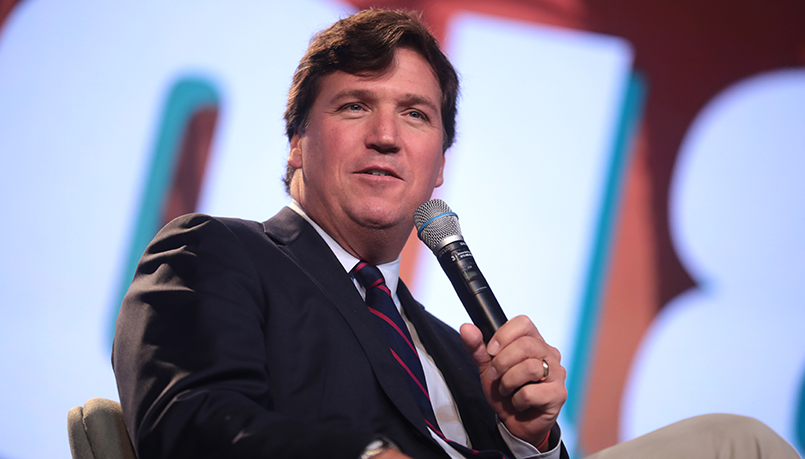
Tucker Carlson at the 2018 Student Action Summit, hosted by Turning Point USA. Photo by Gage Skidmore.
What are we to make of Tucker Carlson’s recent denunciation of free market fundamentalism in a diatribe against Mitt Romney? Has he gone from rallying red state voters to waving the red flag?
Defending the U.S. withdrawal from Syria, Carlson accurately points out how “for generations, Republicans have considered it their duty to make the world safe for banking, while simultaneously prosecuting ever more foreign wars.” He blasts conservatives and liberals for failing to understand that “culture and economics are inseparably intertwined.” He questions the racist myth of a “culture of poverty” in inner cities, pointing out that conservative-dominated rural America “looks a lot like Detroit.” He calls out our “mercenary” leaders and says, provocatively, “If you care about America, you ought to oppose the exploitation of Americans, whether it’s happening in the inner city or on Wall Street.” He even sneaks in a call for shifting the tax burden off the working class by raising taxes on the rich, and especially on capital gains.
Tucker Carlson, ¿presente?
Far from it! His critique of capitalism is rooted in social conservatism, and most directly in male supremacy. He laments the loss of manufacturing jobs for the “decline of male wages” and male-dominated families. Manufacturing work is predominately done by men; hospitals and schools employ more women. Without factories, he claims, women hold higher paying jobs and don’t want to marry men who make less than them–leading to declining marriage rates, more out-of-wedlock births, and generalized societal collapse. His concern isn’t with democracy or equality, but with providing “normal people” with a “clean, orderly, stable society” (under Republican leadership).
Even when he’s questioning the idea of a culture of poverty, he still paints social welfare programs as a Democratic bribe to impoverished communities of color. His problem with racism isn’t that it’s undemocratic or destructive to human dignity—it’s that it just doesn’t work like it used to. Now that white, conservative-leaning, rural voters face unemployment, poverty and substance abuse, it’s impossible to explain away the ravages of capitalism with racist stereotypes.
Is Carlson’s attack on Romney part of a fissure within the right-wing coalition, a split between social conservatives like Carlson and free-market libertarians like the Koch brothers and the rest of the GOP donor base? Trump’s personality and policies have already alienated some conservative evangelicals, notably the Southern Baptist Convention, and there are suggestions that his support among working class white voters is eroding as well.
It’s possible, but we would be unwise to get our hopes up, or to let our guard down. This might be part of a split in the right, but it is certainly an attempt to divide the working class and disorient working class men, in particular.
Carlson’s diagnosis, repeated throughout, is that a coalition of feminists and free-market libertarians have betrayed the American people, and that the primary victims of that betrayal are working class men (“Rich people are happy to fight malaria in the Congo. But to raise men’s wages in Dayton and Detroit?”) and boys (“Our kids, especially our boys, are smoking weed constantly.”) Despite its anti-capitalist and anti-establishment overtones, his analysis reproduces the same virulent misogyny that consolidates the power of the capitalist class—as it did in the 2016 elections, and again with Brett Kavanaugh’s elevation to the Supreme Court.
Our response must be unequivocal. You can’t fight for the working class without fighting against male supremacy, which is at the origin of class society as a whole. You can’t fight for the working class without fighting against white supremacy, which capitalism brought into the world. You can’t pose as a partisan of the working class when you advocate, or even passively tolerate, the subjugation of half its members–or any of its members, for that matter.
So when Tucker Carlson says that adopting his analysis is the best hope of avoiding socialism, he’s right. Subordinating the fight for racial and gender equality to a set of economic demands is not class struggle. Setting economics against identity politics doesn’t just show a misunderstanding of capitalism as a social formation. It expresses a willingness to sell out one section of the working class to the profit of another, a lazy and cowardly rejection of our most basic slogan: “an injury to one, is an injury to all.”
As the political, economic, and environmental crises of capitalism deepen, class consciousness is rising. But it has little space to develop freely; instead, it is hemmed in by the ideological maneuvers of competing factions within the capitalist class. The liberal bourgeoisie attempts to stifle class consciousness, dismissing any critique of neoliberalism as a threat to democratic institutions.
But the neo-fascist right is much more insidious. Rather than dismissing class analysis, they appropriate the economic demands of the working class and twist them into a divisive parody of class struggle. In the early 1930s, the Nazis used this tactic to win a section of the German working class. Today, it is the tool of reactionary demagogues like Steve Bannon, Marine Le Pen, and Donald Trump: parasites who feed on the anger of the working class while spreading the poisons of white supremacy, male supremacy, anti-Semitism, and national chauvinism.
We should understand Tucker Carlson’s analysis for what it is: not a critique of capitalism, not an embrace of or concession to class struggle. It is a fascist attack on the working class, an attempt to destroy the only weapon we have in the fight for socialism: our unity.


 Join Now
Join Now